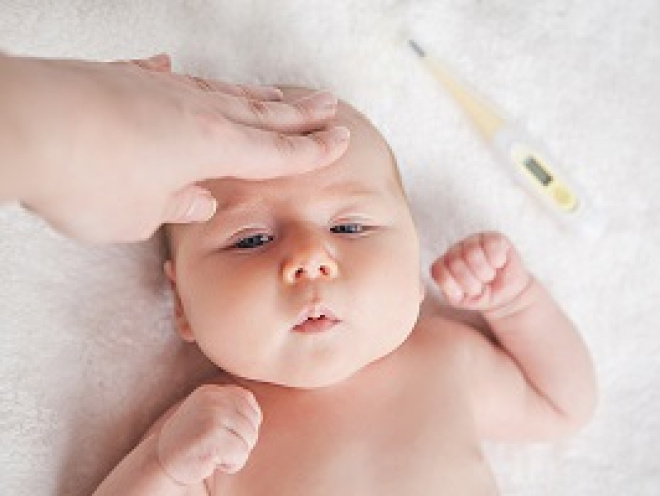If your little one has a mild fever, you can usually treat this at home. We look at ways to help your child recover at home.
In children under five, a fever is a temperature of 38°C (100.4°F) or above. A high temperature in a child can be worrying for parents. But a mild fever will usually pass in a few days and can usually be treated at home (NICE, 2019).
If you're worried about your baby or child, call your GP. If the practice is closed, contact your GP out-of-hours service or call NHS 111. You know what’s usual for your little one, so if you are concerned seek medical advice.
Ten tips for treating a fever at home
Keep your child hydrated
Offer your child plenty of cool water or other drinks (NHS, 2020a). Babies should be offered their usual milk frequently. If you are formula feeding, offer them their usual milk and if you are breastfeeding, offer more frequent breastfeeds. Even if your little one isn't thirsty, try to get them to drink little and often to keep their fluid levels up (NHS 2020a).
Be aware
Keep an eye out for signs of dehydration, such as a dry mouth, no tears, sunken eyes or sunken fontanelle (the soft spot on a baby's head) (NICE, 2019). If you are concerned your little one is dehydrated, seek medical advice.
Food for thought
Only offer your child food if they seem to want some.
Keep them comfy
If it’s warm, help your child stay at a comfortable temperature by covering them with a lightweight sheet or opening a window.
No need for a wet flannel
You don’t need to undress or sponge your child with water. Research shows these don’t help reduce a fever (NICE, 2019).
Don’t overdress them
Avoid bundling your little one up in too many clothes. They should still be appropriately dressed for their surroundings – not under or over wrapped (NICE, 2019).
Rest and relaxation
You could encourage your child to rest. Sick children can get very tired. Spend some time reading to them, offering comfort and reassurance, or enjoy some quiet games together.
Watch over them
Check on your child from time to time during the night (NHS 2020a).
Just stay home
Keep your child away from childcare, nursery or school until the fever has passed (NICE, 2019).
Take care of yourself
It can be exhausting looking after a sick baby or child. Make sure you rest or sleep when you can. Or ask somebody else to help look after them so you can have a break.
Medicines for treating fever at home
Medicines like paracetamol and ibuprofen are commonly used to treat fevers at home. They can help to lower your child's temperature and make them feel more comfortable, but they don’t treat the cause of the fever (NICE 2019).
Medicines like paracetamol or ibuprofen are not recommended solely for the purpose of reducing body temperature in children with a fever, or preventing febrile seizures. This is because there is no evidence to suggest they decrease the risk of seizures (NICE, 2019). But if your child is distressed or in pain you can treat them with the appropriate dose of paracetamol or ibuprofen syrup (NHS 2020a).
Paracetamol can be given to children if they are over three months of age (or over two months to treat fever following routine vaccines). Ibuprofen can be given to children over three months of age and weighing at least 5 kg (NHS 2018). Always read the instructions on the packet.
Aspirin should not be given to children under 16 years old as there is a small risk it could set off a rare condition called Reye’s syndrome. Reye’s syndrome can cause brain and liver damage (NHS, 2019b).
When using paracetamol or ibuprofen in children with fever:
- Continue only for as long as your child appears distressed.
- Do not give both medicines at the same time.
- Consider alternating these medicines if the distress persists or recurs before the next dose is due.
- You know your little one best. Seek medical advice if you are concerned. (NICE, 2019)
This page was last reviewed in March 2021.
Further information
Our support line offers practical and emotional support in many areas of pregnancy, birth and early parenthood: 0300 330 0700.
You might find attending one of our Early Days groups helpful as they give you the opportunity to explore different approaches to important parenting issues with a qualified group leader and other new parents in your area.
Make friends with other parents-to-be and new parents in your local area for support and friendship by seeing what NCT activities are happening nearby.
NICE (2019). Fever in under 5s: assessment and initial managements. NICE guidelines [NG143]. Available at: https://www.nice.org.uk/guidance/ng143/chapter/Recommendations#advice-for-home-care [Accessed March 2021]
NHS (2020a). High temperature (fever) in children. Available at: https://www.nhs.uk/conditions/fever-in-children/ [Accessed March 2021]
NHS (2020b). Is your baby or toddler seriously ill? Available at: https://www.nhs.uk/conditions/baby/health/is-your-baby-or-toddler-seriously-ill/ [Accessed March 2021]
Meningitis Now (no date). Signs and Symptoms in babies and toddlers. Available at: https://www.meningitisnow.org/meningitis-explained/signs-and-symptoms/signs-and-symptoms-babies-and-toddlers/ [Accessed March 2021]
NHS (2019a). Febrile seizures. Available at: https://www.nhs.uk/conditions/febrile-seizures/ [Accessed March 2021]
NHS (2019b). Reye’s Syndrome. Available at: https://www.nhs.uk/conditions/reyes-syndrome/ [Accessed March 2021]
NHS (2018). Can I give my child painkillers? Available at: https://www.nhs.uk/common-health-questions/childrens-health/can-i-give-my-child-painkillers/ [Accessed March 2021]





